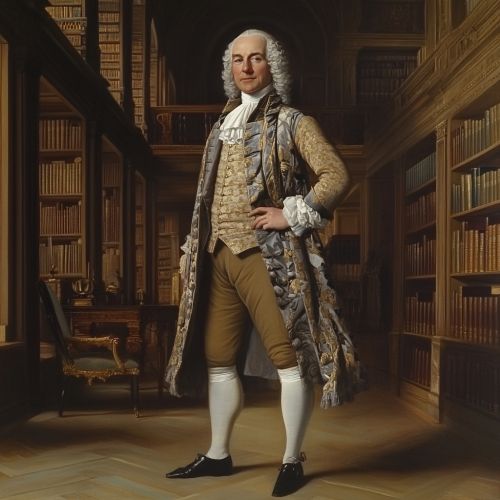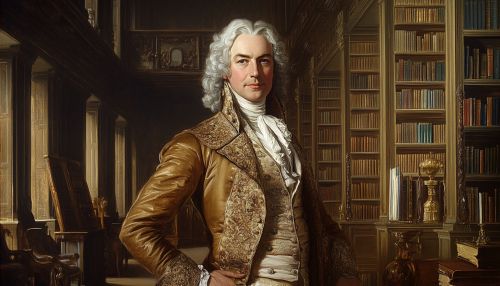Francis North, 1st Earl of Guilford: Difference between revisions
(Created page with "== Early Life and Background == Francis North, 1st Earl of Guilford, was born on December 13, 1704, into the distinguished North family, which held significant influence in British politics and society. He was the eldest son of Francis North, 2nd Baron Guilford, and his wife, Lady Lucy Montagu. The North family lineage was notable for its involvement in the legal and political arenas, with several members serving in prominent judicial and governmental positions. Francis...") |
No edit summary |
||
| Line 15: | Line 15: | ||
In 1752, Francis North was elevated to the peerage as the 1st Earl of Guilford, a testament to his contributions to the state and his family's enduring legacy. The title of Earl of Guilford was a significant honor, reflecting both his personal achievements and the influence of the North family. As an Earl, North took his seat in the House of Lords, where he continued to participate in legislative affairs and advocate for policies aligned with his political beliefs. | In 1752, Francis North was elevated to the peerage as the 1st Earl of Guilford, a testament to his contributions to the state and his family's enduring legacy. The title of Earl of Guilford was a significant honor, reflecting both his personal achievements and the influence of the North family. As an Earl, North took his seat in the House of Lords, where he continued to participate in legislative affairs and advocate for policies aligned with his political beliefs. | ||
[[Image:Detail-98483.jpg|thumb|center|A stately portrait of Francis North, 1st Earl of Guilford, dressed in 18th-century aristocratic attire, standing in a grand library with shelves of books in the background.|class=only_on_mobile]] | |||
[[Image:Detail-98484.jpg|thumb|center|A stately portrait of Francis North, 1st Earl of Guilford, dressed in 18th-century aristocratic attire, standing in a grand library with shelves of books in the background.|class=only_on_desktop]] | |||
== Contributions to Governance == | == Contributions to Governance == | ||
Latest revision as of 22:28, 15 October 2024
Early Life and Background
Francis North, 1st Earl of Guilford, was born on December 13, 1704, into the distinguished North family, which held significant influence in British politics and society. He was the eldest son of Francis North, 2nd Baron Guilford, and his wife, Lady Lucy Montagu. The North family lineage was notable for its involvement in the legal and political arenas, with several members serving in prominent judicial and governmental positions. Francis North's early life was shaped by the expectations and responsibilities that came with his family's status.
Educated at Eton College, one of England's most prestigious schools, North was exposed to a rigorous curriculum that emphasized classical studies, rhetoric, and the arts. This education laid the foundation for his future roles in public service and governance. Following his time at Eton, North attended Trinity College, Oxford, where he furthered his studies in law and politics, disciplines that would prove essential in his later career.
Political Career
Francis North's political career began in earnest with his election to the House of Commons in 1727 as the Member of Parliament for Banbury. His tenure in the Commons was marked by his alignment with the Whig party, which was dominant in British politics during the early 18th century. North's political acumen and family connections facilitated his rise through the ranks, and he became known for his eloquence and skill in debate.
In 1734, North was appointed as a Lord of the Treasury, a position that involved overseeing the financial affairs of the government. This role allowed him to gain valuable experience in fiscal management and policy-making. His competence in this position led to his appointment as the Paymaster of the Forces in 1737, a critical role during a period of military expansion and conflict.
Elevation to the Peerage
In 1752, Francis North was elevated to the peerage as the 1st Earl of Guilford, a testament to his contributions to the state and his family's enduring legacy. The title of Earl of Guilford was a significant honor, reflecting both his personal achievements and the influence of the North family. As an Earl, North took his seat in the House of Lords, where he continued to participate in legislative affairs and advocate for policies aligned with his political beliefs.


Contributions to Governance
During his time in the House of Lords, Francis North played a crucial role in several key legislative initiatives. He was particularly involved in matters related to finance and trade, areas in which he had developed considerable expertise. North was a proponent of policies that aimed to strengthen Britain's economic position and expand its influence overseas.
One of his notable contributions was his involvement in the development of the Navigation Acts, a series of laws designed to regulate trade between England and its colonies. These acts were instrumental in ensuring that the economic benefits of colonial trade were directed towards the British economy. North's support for these measures underscored his commitment to enhancing Britain's commercial power.
Personal Life and Legacy
Francis North married Lady Lucy Montagu, the daughter of George Montagu, 1st Earl of Halifax, in 1728. The marriage was a union of two influential families and produced several children, including Frederick North, who would later become the Prime Minister of Great Britain. The North family's legacy continued through their descendants, who remained active in British politics and society.
North's personal life was characterized by his dedication to his family and his estate. He was known for his patronage of the arts and his support for educational initiatives, reflecting his belief in the importance of culture and learning. His contributions to public life and his family's enduring influence have cemented his place in British history.
